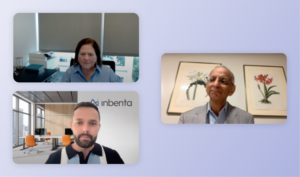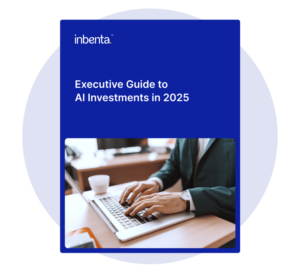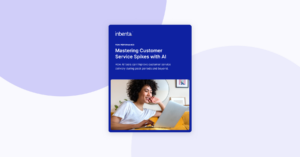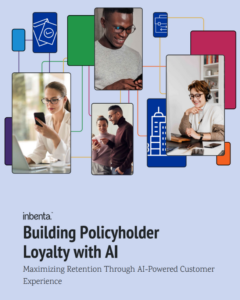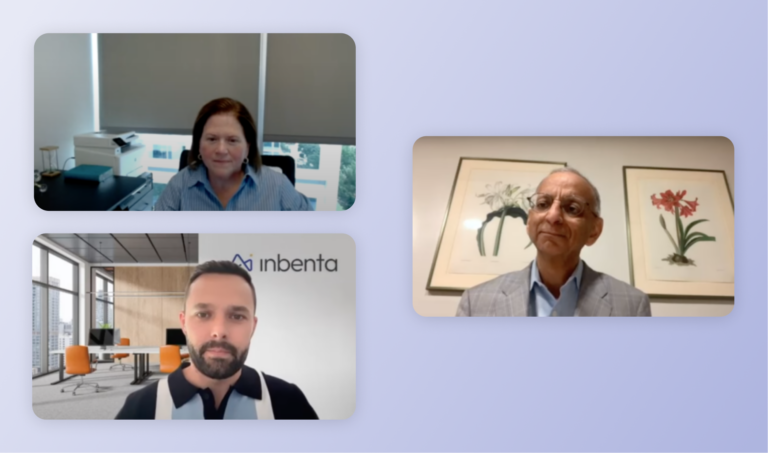This article has been written by Richard Conn, Senior Director of Search Marketing at RingCentral US.
Job hunting is a tiring activity. And the process behind job hunting has changed for both the employee and employer. Whereas before, all it took was a CV and personal interview, it’s normal for candidates to now face a 5-stage interview process. Today, with such high competition, people are lucky if they get called back for round one.
It’s no wonder people say job hunting is like doing a full-time job in itself!
Often, too, employers leave it down to candidates to make a good impression. Forgetting that they also need to leave a positive imprint.
Companies are always making careless faux pas. Perhaps the interview took place on a cloud phone system and the interviewer left an applicant waiting for 30 minutes. Or maybe an applicant just never heard back from a firm at all. Something that becomes even more frustrating if you spent two hours filling out an application form. Not to mention the time spent answering questions like, “what do you think is the best ERP for retail?”
When people have a negative experience, they are more likely to share that experience with another person in one way or another. Not only does this give you an unwanted bad reputation, but it can cost your company a lot of money, too!
What’s the solution?
As a busy person and a company with a thousand and one things to do, it can feel like too much effort to respond to every application. Or to give interview feedback. So, how do you find the perfect candidate without putting people off?
Well, as tech evolves, there are ways we can use it in almost every aspect of our working lives. AI is having a huge impact on the modern world. It can do anything from forecasting sales and changing the marketing team culture, to using biometrics to log into systems.
But have you ever considered using it as part of the hiring process? More specifically, have you thought about using an AI-powered chatbot as part of your hiring process?
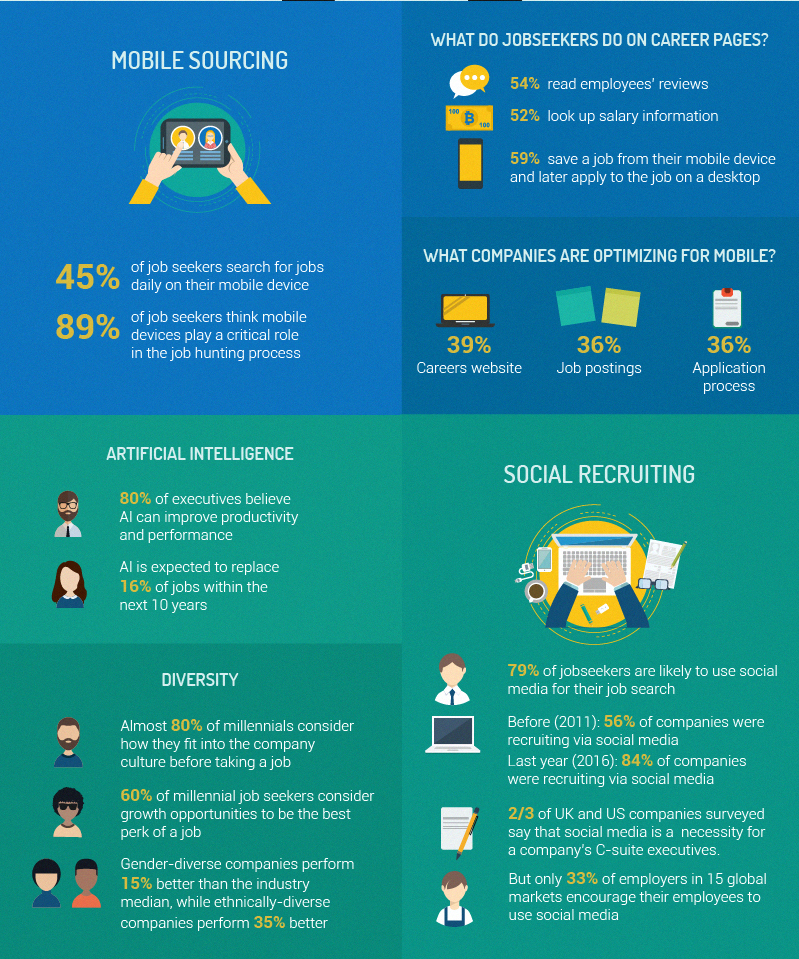
Source: HR Daily Advisor
You may already be increasing sales with chatbots, by using them to talk to customers. However, when incorporated into the recruitment process, they can make a job more accessible. They also help build communications with candidates and take away a LOT of extra hassle for you.
In case you aren’t aware, a chatbot is a piece of software that uses AI to mimic human conversation. They are used widely both on websites and through voice services. They’re excellent at storing masses of data and responding to people quickly.
The more that chatbots are being used as part of the digital experience, the more comfortable people are with it. In fact, many people now expect it. And when it comes to job hunting, 82% of job seekers believe the ideal process to be a mix of technology and human-led communication. That is, according to Ideal Recruiter.
Use chatbots to respond
This is a sort of a ‘put yourself in their shoes’ scenario. Imagine if, as a job hunter, you find your perfect job on a recruitment site. So, you put all the time and effort you can into filling out the pages and pages of information required, the best you can.
You put in your education, your work history, and the reason you want the job. You even fill out the extra questions that companies tend to ask to filter out. Like, “What would you do if you were talking to a client and they had a bad virtual meeting with you?”
It takes a long time but eventually, you send the application off. Eager for a response, you wait… and wait… and wait.
There is no response.
And to make it worse, this happens with the majority of jobs you have applied for. Inevitably, you get depressed.
Perhaps the would-be recruiter eventually does get back to you. And you have an interview. Hurray! By that point, however, you have forgotten the details of the job. And quite frankly, you are unsure if you want to work for a company that clearly has no respect for you. The least they could have done was to send you an update of how the application was going.
Of course, from your point of view as an employer, you know it isn’t always possible to respond to every single application.
This is where chatbots come in. If you already use chatbots in your business, then you will already know how great they are at communicating with people when you don’t have time to. One of their best features is being able to give fast and prompt feedback and status updates.
This means that chatbots can not only answer frequently asked customer queries like, “what is fax?”, they can also respond swiftly to job applications.
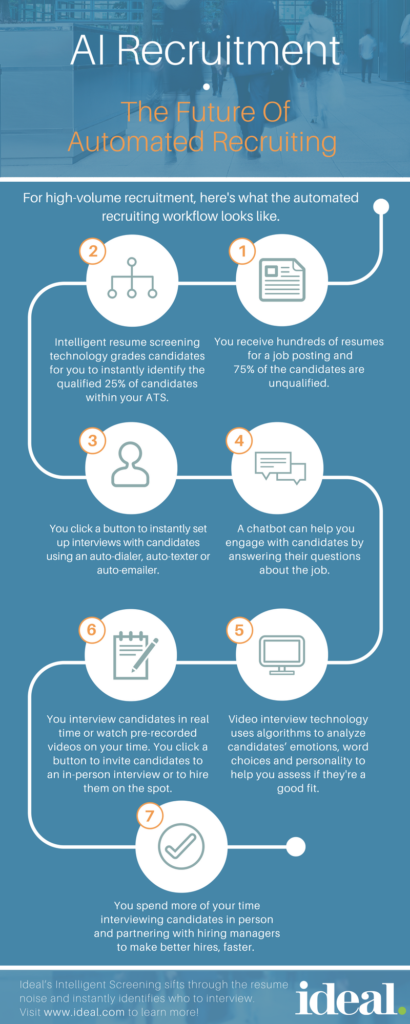
Source: Ideal
AI Recruitment : How does this work?
To use chatbots in this way, you programme them to respond to every application by saying something like:
“Thank you so much for your application, we appreciate the time and effort you have already put in! We are very excited you want to work with us! We have received a very high volume of applications, so please be aware that we may not be able to respond to every single application. Otherwise, good luck!”
This response is generic enough to be sent to every applicant, at the same time as being personable enough to boost the applicant’s morale. And it shows that you are a company people want to work for.
If you are super busy and are struggling to find the time to look through applications, a chatbot could even send another message a week later saying:
“Thanks for bearing with us. Just to let you know we are still looking through applications and will let you know if you are successful by the end of the week. If you are successful, you will be invited to a phone teleconferencing interview where we will assess your suitability to the role.”
In doing this, people will keep you in their mind and will know what to expect and by when. Rather than being left in the dark, wondering what happened to their application.
Just like with a B2C interaction, an applicant will tell the world if they have a negative experience with you. Software Advice tells us that a massive 59% of people who have a bad application experience with a company will try to put others off. However, the same company also tells us that 88% of candidates with a good experience will tell people to apply for the firm.
So, to avoid a bad review on Glassdoor, give people a good experience and keep up the communications with a chatbot. This will encourage people to give you a good name. Whether they get the job or not.
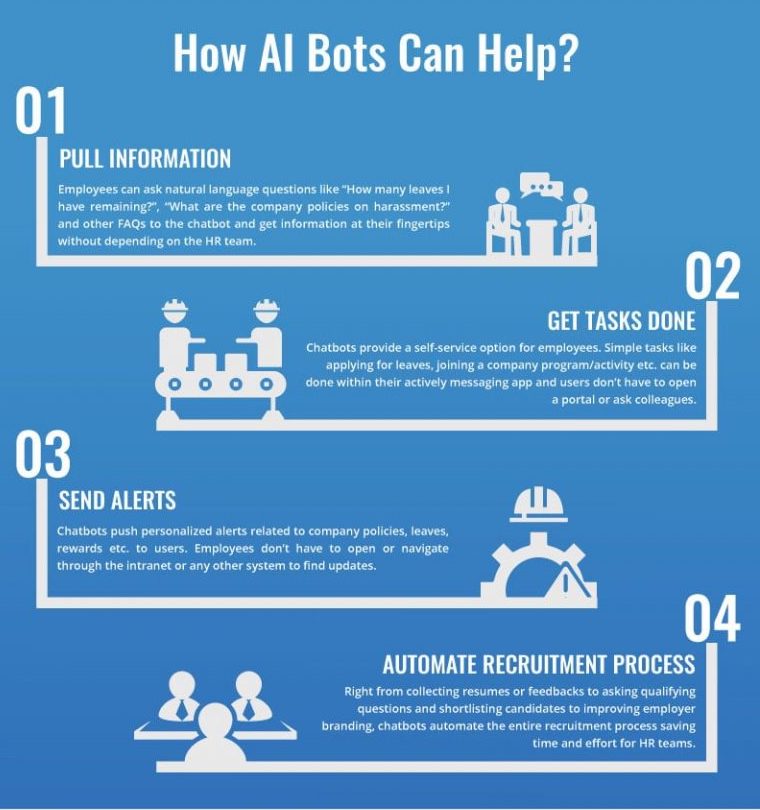
Source: Botcore
HR department : Use a chatbot for your own benefit
Of course, the reason you are wanting to hire a new candidate is to benefit your company. So, it only makes sense to use chatbots for your own purposes, too. Chatbots can scan through applications and collect vital information. They can screen CVs and find information relevant to the role. Narrowing down suitable applications and making the process easier for you.
Once an application has been screened, a chatbot can give feedback. Either by rejecting a candidate or scheduling an interview with them. This is done by using the company calendar or even an integrated online booking system. What this also means is that applicants don’t have to fill out hefty application forms as bots can easily sift through CVs. So, time and energy are saved all around.
Firms are getting higher levels of responses and chatbots are looking through applications more quickly. Meaning companies are more likely to receive better quality applications. This is because applicants aren’t spending hours filling out long application forms with no response. Their morale is boosted and the effort they put in, whether through a simple CV or more complex application form, is higher.
The more information is gathered, the more chatbots will know how to detect the ‘right’ from the ‘wrong’ answers. Say a chatbot asks the question, “Tell us about a time you used video conferencing solutions.” Over time, they will learn the ‘best’ answers. They will then be able to rank the competing applicant’s answers and send this information on to human resources.
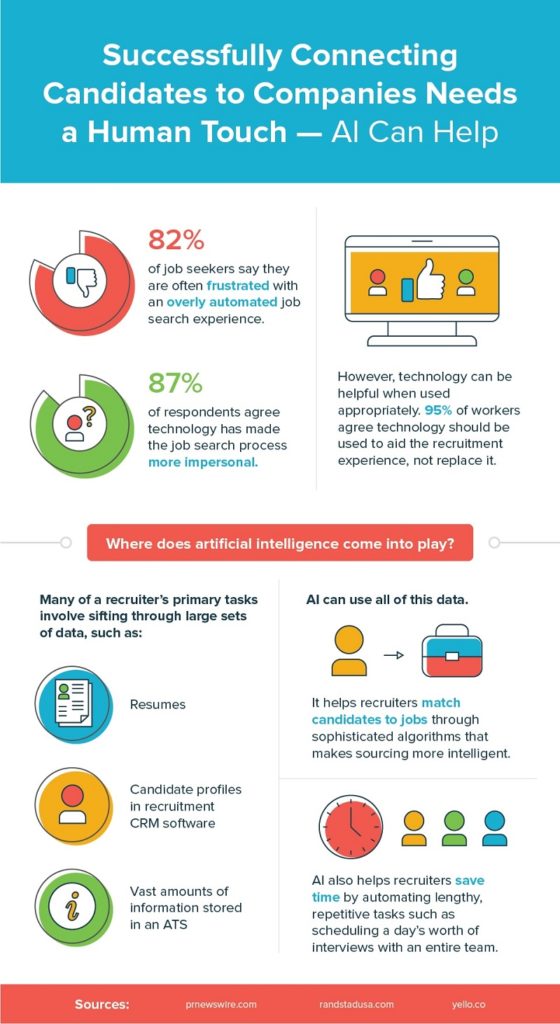
Source: Inside Big Data
Use chatbots to modernise recruitment processes
Often, candidates go through the rigmarole of long application forms on computers. But why not hire through mobile phones instead? It seems controversial, but this recruitment method is increasingly on the rise.
After all, many applicants feel that filling out long application forms creates a negative job search experience.
Chatbots can be used to screen applicants by asking them a series of questions via text. This is not only quick, but it is more engaging, too. It takes the pressure off candidates and stops you having to look through reams of candidate information. Then, if an applicant has answered all the questions well, you can send them through to the next stage.
As we move into a remote future we must start to think in a more employee-focused way. Sending questions via text is more relaxed and shows that you are considering what works best for potential employees. As well as for yourself.
You can also optimise chatbots on social media. If an applicant has any questions, they can contact your company on Facebook and ask away. They will get a quick and accurate response which gives them a good impression of your firm.
A really important part of using chatbots to ask questions over text is that it helps people who may have certain needs. It may be that a person needs bigger text, which they can access on their phones. Or perhaps they find it overwhelming to receive a lot of information at once. In which case, breaking down questions via text can make things much easier for them to process and let them give better answers.
Many employers miss out on great potential candidates by not considering these things.
Are there downsides to chatbots?
Using a chatbot in the hiring process has many advantages. But they have some disadvantages, too. Sure, they can help pick out the best VoIP service engineer from a thousand applications, but that doesn’t make them perfect.
To start with, there is an idea that chat can be very, well, robotic as chatbots aren’t always programmed to use slang or colloquialisms. Which means that people worry sometimes, if people ask questions using an idiom, for example, that the bot won’t be able to respond.
However, whereas before it was true that chatbots struggled to understand metaphors, slang, and other non-standard speech, today, they’ve upped their game and are able to understand much more complicated or unusual phrases and messages. That’s in large part thanks to natural language processing (NLP) technology, and the smarter chatbots it enables.
Another issue is that people also think chatbots tend to lack human warmth. There aren’t any “it’s lovely to hear from yous” or, “Enjoy your afternoons” coming from a chatbot. Yet, developers have been working hard to tackle this problem.
AIML (Artificial Intelligence Markup Language) is the way that engineers programme chatbot language. Today, after recognising the issue with warmth, chatbots are much friendlier and talk in a far more human fashion.
One more problem, however, is that companies are never quite sure how people will react to chatbots. Yet, as long as they are answering questions correctly and responding to people swiftly, they tend to have a positive response.
Conclusion
Look at the way you hire candidates right now. Does it take you a while to respond to people? Or do you simply find there are applicants you don’t respond to at all? If so, then consider adding a chatbot to your hiring process. It’s not only a great way of moving into the future, but it keeps candidates happy, gives you a good name, and saves you time on the whole process in general.
It also means that candidates don’t have to fill out excessively long application forms. And most importantly, bots can sift through applications to find the perfect candidate for you. It’s a win/win all around.
Do keep in mind, though, that chatbots are not replacements for humans. Maybe one day, but not today. Which means that although chatbots will help a lot with saving time and money, it is ultimately a human that has to have the final say.
Now that you’re convinced of all the benefits chatbots can bring to the recruitment process, you’re only missing a great tool. Find out how Inbenta’s intelligent Chatbot module can help your organization streamline recruitment efforts thanks to our patented and proprietary technology.
Richard Conn – RingCentral US
Richard Conn is the Senior Director, Search Marketing for RingCentral, a global leader in unified communications and call center service. He is passionate about connecting businesses and customers and has experience working with Fortune 500 companies such as Google, Experian, Target, Nordstrom, Kayak, Hilton, and Kia. Richard has written for sites such as Rightinbox and Marketscale.


